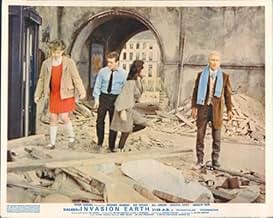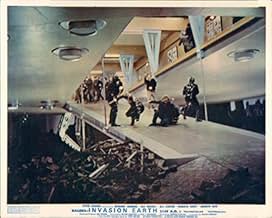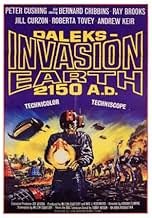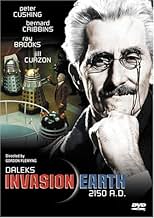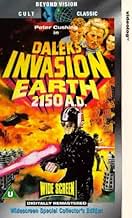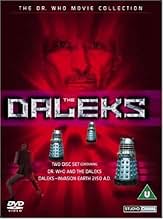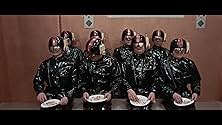CALIFICACIÓN DE IMDb
5.9/10
4.8 k
TU CALIFICACIÓN
El Dr. Who y sus compañeros llegan a la Tierra en el año 2150 d.C., solo para descubrir que el planeta ha sido invadido y su población esclavizada por los temidos Daleks.El Dr. Who y sus compañeros llegan a la Tierra en el año 2150 d.C., solo para descubrir que el planeta ha sido invadido y su población esclavizada por los temidos Daleks.El Dr. Who y sus compañeros llegan a la Tierra en el año 2150 d.C., solo para descubrir que el planeta ha sido invadido y su población esclavizada por los temidos Daleks.
- Dirección
- Guionistas
- Elenco
Opiniones destacadas
I first saw this movie as a kid back in the 70's.It was screened as a saturday morning feature during the easter holidays.In those days it was the only 'repeat' you were likely to get.I can never understand the general disdain shown to it by Dr Who fans.The production values are high and there's plenty to keep you entertained.I think fans are critical of it because of its comical element.Yes it's cheap,ham-acted at times and the special effects not-very-special,but so was the tv series.I love this movie because of,not despite,its cheesiness.
I am a fan of the Doctor Who TV show, both in its original incarnation and in modern dress. I've also seen the two earlier movies and thought them odd and sad. I was therefore shocked and pleased to find this movie version of "The Dalek Invasion of the Earth" serial to be excellent. The pacing is better, the color photography by John Wilcox has its moments of beauty -- even the Technicolor Daleks have a peculiar beauty.
Working with only minor variations from the television serial, this demonstrates something I have long maintained: the writing on the TV DOCTOR WHO was often first rate. It was the cripplingly tiny budgets that often made it seem ridiculous, with its impossible shooting schedules, cardboard sets and monsters that frequently seemed to be a man lurking under a cast-off shag rug.
The memories of children often play them false in later years. People report on seeing a particular favorite DOCTOR WHO serial from childhood and being shocked at how much better it is in memory than looking at it as adults. Children assume the lovely details that the adult mind demands. How very pleasant for this adult to see them filled in here!
Working with only minor variations from the television serial, this demonstrates something I have long maintained: the writing on the TV DOCTOR WHO was often first rate. It was the cripplingly tiny budgets that often made it seem ridiculous, with its impossible shooting schedules, cardboard sets and monsters that frequently seemed to be a man lurking under a cast-off shag rug.
The memories of children often play them false in later years. People report on seeing a particular favorite DOCTOR WHO serial from childhood and being shocked at how much better it is in memory than looking at it as adults. Children assume the lovely details that the adult mind demands. How very pleasant for this adult to see them filled in here!
In this British science fiction adventure, London policeman Tom Campbell (Bernard Cribbens) enters what he thinks is a police call-box only to discover that it's the TARDIS, the physics-defying home/ship of Doctor Who (Peter Cushing). Campbell is brought along as the Doctor, along with his granddaughter Susan (Roberta Tovey) and assistant Louise (Jill Curzon), travel through time to the year 2150, only to discover a London in ruins. The nefarious alien race known as the Daleks have conquered the Earth, and is rounding up the few surviving people to work as either slave labor, or even worse, as mind-controlled Robo-Men. It's up to the Doctor and his companions to free the human race from bondage.
This is the sequel to 1965's Dr. Who and the Daleks, which had also starred Cushing in the title role, although neither of these films are considered part of the ongoing Dr. Who canon. From what I've read, most true-blue Who fans detest these movies, although I don't have any special feeling toward the series so these movies didn't bother me in that respect. They are both slightly dopey, with a comical undertone and definite targeting of the younger members of the audience. I've always found the Daleks to be quite silly, and their accented, screamed statements ("Exterminate!") a source of much amusement. However, the movie is generally entertaining, and it doesn't overstay its welcome. Plus, I always like to see something I haven't seen before with Peter Cushing.
This is the sequel to 1965's Dr. Who and the Daleks, which had also starred Cushing in the title role, although neither of these films are considered part of the ongoing Dr. Who canon. From what I've read, most true-blue Who fans detest these movies, although I don't have any special feeling toward the series so these movies didn't bother me in that respect. They are both slightly dopey, with a comical undertone and definite targeting of the younger members of the audience. I've always found the Daleks to be quite silly, and their accented, screamed statements ("Exterminate!") a source of much amusement. However, the movie is generally entertaining, and it doesn't overstay its welcome. Plus, I always like to see something I haven't seen before with Peter Cushing.
The On Her Majesty's Secret Service of the Doctor Who world, the two Peter Cushing-Dalek films have seen occasional reappraisal that labels them as "coolly kitsch" or "lovably camp". In reality, of course, they're complete pants.
The Doctor Who TV series actually had a considerable integrity, despite being made on a budget of 50p and never managing to shake off the "Kid's Telly" tag. Here Cushing plays the Doctor of the title, his surname actually becoming "Who". The Tardis, his sophisticated space-time machine, is now "Tardis", a naff-looking thing with a Yale lock on the door. Around the time this was made a "Carry On" actor would do his only television work in the Doctor Who series Peter Butterworth as the Meddling Monk. For the film we got Bernard Cribbins as P.C. Tom Campbell, a similar character to the one that married the Doctor's granddaughter on TV. Though as the film Susan is only ten that would be inappropriate here.
Both films (the other Doctor Who and the Daleks, Cushing joined by Roy Castle) were based directly on actual TV stories, the novelty being they were in colour. By the time the second came around the novelty was over and it didn't do the business of the first, despite being someway the better film. Perhaps this is because the original serial The Dalek Invasion of Earth was an attempt to mount a film's epic scale on a TV budget. To this end it transfers better to the medium, and its setting (future Earth as opposed to the first film's alien planet Skaro) is more accessible to audiences.
The big failure is, of course, send-up. Some of the series' b-movie concepts (mutated nuclear war victims get robot-armoured shells and invade Earth to steal its core) are ludicrous, but played straight can be rewarding. The films make a mockery of the whole concept, showing a total lack of respect for their source material. My advice is: if you don't like 'em, don't make 'em. Bearing in mind the Daleks were hot merchandise properties at the time, this is a cynical cash-in on the nation's youth. There's even a shameless product placement for Sugar Puff Cereals.
All involved are capable of better. Peter Cushing, respected in adult horror films, here opts for a no-effort parody of TV Doctor William Hartnell's performance. There is no trace of depth or consideration for the part he has chosen. Full credit does go to Ray Brooks, Andrew Keir and Philip Madoc for at least trying to take it seriously. Madoc was rewarded with four seperate roles in the television series, most notably as mad scientist Solon (1976) and The War Lord (1969). On the plus side, direction in terms of camera angles is actually very, very good, but is offset by incidental music so loud and outdated that it works against the mood entirely. Think SF drama with Carry On music and you're almost there.
Bright and colourful, (including a funky red Dalek) the film certainly has visual appeal. But the Daleks' voices, their volume increased considerably, are extremely grating. They also lack their trademark warmth and charm, being little more than robots. Their weaponry was scheduled to be flame-throwers, but was disallowed due to the young audience. This is perhaps fortunate as their gas sprays aid the Nazi allegory. Best bit? The exploding shed.
Trite jazz, lame comic setpieces and binliner outfits, the film is on TV virtually every Bank Holiday in England. And you know the strangest part? As bad as it is, come next Bank Holiday I'll probably be tempted to see it again.
The Doctor Who TV series actually had a considerable integrity, despite being made on a budget of 50p and never managing to shake off the "Kid's Telly" tag. Here Cushing plays the Doctor of the title, his surname actually becoming "Who". The Tardis, his sophisticated space-time machine, is now "Tardis", a naff-looking thing with a Yale lock on the door. Around the time this was made a "Carry On" actor would do his only television work in the Doctor Who series Peter Butterworth as the Meddling Monk. For the film we got Bernard Cribbins as P.C. Tom Campbell, a similar character to the one that married the Doctor's granddaughter on TV. Though as the film Susan is only ten that would be inappropriate here.
Both films (the other Doctor Who and the Daleks, Cushing joined by Roy Castle) were based directly on actual TV stories, the novelty being they were in colour. By the time the second came around the novelty was over and it didn't do the business of the first, despite being someway the better film. Perhaps this is because the original serial The Dalek Invasion of Earth was an attempt to mount a film's epic scale on a TV budget. To this end it transfers better to the medium, and its setting (future Earth as opposed to the first film's alien planet Skaro) is more accessible to audiences.
The big failure is, of course, send-up. Some of the series' b-movie concepts (mutated nuclear war victims get robot-armoured shells and invade Earth to steal its core) are ludicrous, but played straight can be rewarding. The films make a mockery of the whole concept, showing a total lack of respect for their source material. My advice is: if you don't like 'em, don't make 'em. Bearing in mind the Daleks were hot merchandise properties at the time, this is a cynical cash-in on the nation's youth. There's even a shameless product placement for Sugar Puff Cereals.
All involved are capable of better. Peter Cushing, respected in adult horror films, here opts for a no-effort parody of TV Doctor William Hartnell's performance. There is no trace of depth or consideration for the part he has chosen. Full credit does go to Ray Brooks, Andrew Keir and Philip Madoc for at least trying to take it seriously. Madoc was rewarded with four seperate roles in the television series, most notably as mad scientist Solon (1976) and The War Lord (1969). On the plus side, direction in terms of camera angles is actually very, very good, but is offset by incidental music so loud and outdated that it works against the mood entirely. Think SF drama with Carry On music and you're almost there.
Bright and colourful, (including a funky red Dalek) the film certainly has visual appeal. But the Daleks' voices, their volume increased considerably, are extremely grating. They also lack their trademark warmth and charm, being little more than robots. Their weaponry was scheduled to be flame-throwers, but was disallowed due to the young audience. This is perhaps fortunate as their gas sprays aid the Nazi allegory. Best bit? The exploding shed.
Trite jazz, lame comic setpieces and binliner outfits, the film is on TV virtually every Bank Holiday in England. And you know the strangest part? As bad as it is, come next Bank Holiday I'll probably be tempted to see it again.
Hurrah. Here come the daleks. Again.
But don't be scared. They're in fine fettle this time and while this film is just as daft as its predecessor it's far better-paced and the good guys don't have stupid eye make-up, instead resembling good old London Council Workers, circa 1955. It's a slight anachronism, but I like the idea of a sci-fi setting where the heroes are all unshaven working class 'Uncle Fred, Friend of Your Dad' types who wear jackets and caps that make them look like bin men. I suppose actually, given that the Daleks do resemble (and are referred to as) motorised dustbins, there's probably some poetry in this. Anyway, forget the title, this might as well be set in 1950 AD - it certainly feels a bit Ealing at times.
So, how is this rather entertaining nonsense an improvement on the cinematic war-crime that was the first film? Well, just that, it's entertaining. The Daleks are still quite funky, despite their ongoing choice of fire-extinguisher weaponry. They're also much more enthusiastic these days - we even see one going for a swim at one point (I can't think of a better explanation! You'll see what I mean...).
Anyway - the plot? Well, I suspect the title might give it away. In fact, I'm not sure it even IS the title. Maybe they just wrote the plot-summary in the wrong box. Whatever, I don't feel I'll be spoiling anything if I give you the following outline: Daleks have invaded Earth because they felt like it, and are now constructing a large Roller Disco/Cinema Multiplex/Dodgem park in Bedfordshire.
Okay, they're not, but it's entirely as likely and sensible as what they ARE doing there (or as the swimming Dalek). There are some great British actors having fun in this - Philip Madoc from Wales, Andrew Keir from Scotland, Peter Cushing from England. A truly unified effort - all silly together.
People who smashed their television set in an effort to survive the first film will be pleased to see that Roy Castle is not reprising his role as Ian (for those who didn't see it, I rather suspect George Lucas got his idea for Jar Jar Binks from Castle's performance), and has been replaced in the light relief stakes by the altogether defter and more endearing Bernard Cribbins (for non-British readers, Cribbins is one of the most highly regarded and acclaimed English actors of the last forty years, and his profound performance in The Wombles is still remembered by many people of my generation today).
For that matter, even Peter Cushing's mad professor is rather good this time round, and provided one doesn't expect more than robot monsters, rubbish flying saucers, and huge armies of (toy miniature) Daleks, not to mention quite a few laughs, then this will pass 80-odd minutes in quite an agreeable manner. Not as effectively as becoming an alcoholic, but more so than banging your head against concrete. I suppose this is the bottom line really - watch this film too many times and it remains preferable to headbutting a concrete wall, which is painful. Watch the first film too many times and you'll find the experience of headbutting a wall strangely comfy on account of all the padding it will have acquired.
But don't be scared. They're in fine fettle this time and while this film is just as daft as its predecessor it's far better-paced and the good guys don't have stupid eye make-up, instead resembling good old London Council Workers, circa 1955. It's a slight anachronism, but I like the idea of a sci-fi setting where the heroes are all unshaven working class 'Uncle Fred, Friend of Your Dad' types who wear jackets and caps that make them look like bin men. I suppose actually, given that the Daleks do resemble (and are referred to as) motorised dustbins, there's probably some poetry in this. Anyway, forget the title, this might as well be set in 1950 AD - it certainly feels a bit Ealing at times.
So, how is this rather entertaining nonsense an improvement on the cinematic war-crime that was the first film? Well, just that, it's entertaining. The Daleks are still quite funky, despite their ongoing choice of fire-extinguisher weaponry. They're also much more enthusiastic these days - we even see one going for a swim at one point (I can't think of a better explanation! You'll see what I mean...).
Anyway - the plot? Well, I suspect the title might give it away. In fact, I'm not sure it even IS the title. Maybe they just wrote the plot-summary in the wrong box. Whatever, I don't feel I'll be spoiling anything if I give you the following outline: Daleks have invaded Earth because they felt like it, and are now constructing a large Roller Disco/Cinema Multiplex/Dodgem park in Bedfordshire.
Okay, they're not, but it's entirely as likely and sensible as what they ARE doing there (or as the swimming Dalek). There are some great British actors having fun in this - Philip Madoc from Wales, Andrew Keir from Scotland, Peter Cushing from England. A truly unified effort - all silly together.
People who smashed their television set in an effort to survive the first film will be pleased to see that Roy Castle is not reprising his role as Ian (for those who didn't see it, I rather suspect George Lucas got his idea for Jar Jar Binks from Castle's performance), and has been replaced in the light relief stakes by the altogether defter and more endearing Bernard Cribbins (for non-British readers, Cribbins is one of the most highly regarded and acclaimed English actors of the last forty years, and his profound performance in The Wombles is still remembered by many people of my generation today).
For that matter, even Peter Cushing's mad professor is rather good this time round, and provided one doesn't expect more than robot monsters, rubbish flying saucers, and huge armies of (toy miniature) Daleks, not to mention quite a few laughs, then this will pass 80-odd minutes in quite an agreeable manner. Not as effectively as becoming an alcoholic, but more so than banging your head against concrete. I suppose this is the bottom line really - watch this film too many times and it remains preferable to headbutting a concrete wall, which is painful. Watch the first film too many times and you'll find the experience of headbutting a wall strangely comfy on account of all the padding it will have acquired.
¿Sabías que…?
- TriviaPeter Cushing supposedly only agreed to do this film if Roberta Tovey returned as his grand-daughter alongside him, having built up a rapport on the previous film.
- ErroresThe Dalek in the Thames does not flash its lights when addressing the Robomen, as the casing did not contain an operator.
- Versiones alternativasSome versions of the film open with the credits sequence before switching to Tom's night-time street patrol. The original version opens with the raid, then the titles, then Tom's awakening in TARDIS.
- ConexionesFeatured in Movie 4: Invasion Earth, 2150 A.D. (1972)
Selecciones populares
Inicia sesión para calificar y agrega a la lista de videos para obtener recomendaciones personalizadas
- How long is Daleks' Invasion Earth 2150 A.D.?Con tecnología de Alexa
Detalles
- Fecha de lanzamiento
- País de origen
- Idioma
- También se conoce como
- Dr. Who: Daleks Invasion Earth 2150 A.D.
- Locaciones de filmación
- Slipway, Battersea Church Road, Battersea, London, Greater London, Inglaterra, Reino Unido(Dalek rising out of the river)
- Productoras
- Ver más créditos de la compañía en IMDbPro
Taquilla
- Presupuesto
- GBP 286,000 (estimado)
- Total a nivel mundial
- USD 115
Contribuir a esta página
Sugiere una edición o agrega el contenido que falta

Principales brechas de datos
By what name was Daleks' Invasion Earth 2150 A.D. (1966) officially released in India in English?
Responda


